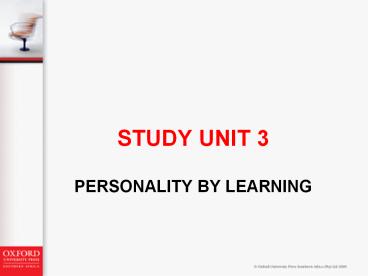PERSONALITY BY LEARNING - PowerPoint PPT Presentation
Title:
PERSONALITY BY LEARNING
Description:
STUDY UNIT 3 PERSONALITY BY LEARNING * * What are the main contributions of behaviourism and why is it important in psychology? Discuss the background to the ... – PowerPoint PPT presentation
Number of Views:174
Avg rating:3.0/5.0
Title: PERSONALITY BY LEARNING
1
PERSONALITY BY LEARNING
- STUDY UNIT 3
2
- What are the main contributions of behaviourism
and why is it important in psychology? - Discuss the background to the behaviourist view
of human nature - Name and discuss the basic assumptions of
behaviourism - Discuss the response patterns in personality
structure - Describe the structure, development, motivation
and adjustment of personality according to
behaviourism - Describe learning and psychological health.
3
Behaviourist view of human nature
- Personality
- develops through a learning process
- is characterised by and recognised in patterns of
responses - Peoples existence is dependent on their
abilities to repeat specific behaviours in
general and specific situations - Behaviourist theories
- Type 1 Classical or radical behaviourist
perspective - Personality and behaviour viewed as mechanical
- Personality like behaviour determined by
conditioning - Personality can be studied only through
observable behaviour - Type 2 Social learning or social-cognitive
learning - Reaction to stimuli based on motivational value
of stimuli or behaviour - People are more in control of events through
internal motivation.
4
Assumptions of the behaviourist
- Observable behaviour
- Controlled experiments and field studies
- Environments and situations shape behaviour
- Nurturing factor behaviour is informed by
environmental situational influences - Environmental and situational stimuli cause
conditioned responses - Personalitys relationships to learned responses
- All human behaviour is learned
- Stimulus-response (S-R) relationship
- S-O-R principle
- Self control
- People are co-shapers of personality
- Learning and unconscious factors
- Thinking happens at a level of unawareness or
parallel processing.
5
Response patterns in personality structure
- Responses are learnt or recurrent patterns of
behaviour - Respondent behaviour behaviour which follows
from known stimuli - Simple, automatic or involuntary response, such
as a reflex - Complex response such solving a mathematical
problem - Positive reinforcers and negative rewards are
used to structure peoples behaviours - Response tendencies and hierarchy of responses
are the result of multiple learning experiences - Drive reduction and habits
- Consistency is one of the ideals of personality
researchers - Situationism personality and behaviour can be
situation-specific.
6
Motivation
- Reinforcement
- Variable emphasis of reinforcement bydifferent
learning approaches - Responses are activated by internal andexternal
stimuli - Behaviour is shaped and maintained through
positive, negative and partial reinforcement - Habituation
- Forming of habits
- Drives as activators
- Drives are stimuli which activate particular
responses - Drives can be internal biological states or
acquired social states - Homeostasis creating balance or stability in
behaviour.
7
Conditioning processes
8
More concepts of motivation
- Person-environment interaction
- Cognitive control
- Behaviour regulation
- Social cognitive theory
- Situationism
- Interactionism.
9
Positive behavioural concepts
- Psychological situation
- Signature situations
- Self regulatory plans
- Expectancies generalised expectancy
- Locus of control internal and external
- Personal hardiness,
- Self efficacy
- Vicarious learning
- Learned resourcefulness
- Learned helplessness.
10
Learning in personality development
- Key concepts in learning-development approaches
include - Social reinforcement
- Critical situations
- Identification
- Modelling
- Imitation
- Personality development is a process of gradual
or continuous learning through reinforcement - Determined by physical and psychosocial
environmental factors - Over time, people develop contingencies or
particular types of responses applicable to
different situations - Become an individuals enduring, consistent and
core characteristics of personality - May change as experience of consequences or
environment changes or when purpose of behaviour
is no longer served.
11
Learning in personality development (continued)
- Life long process of learning, changing and
unlearning - Simple and passive processes (trial and error)
- Active and complex (rational and active
intervention) - Most learning takes place via classical or
operant conditioning - Environmental stimuli important determinants or
influences on personality - Physical, psychological and socioeconomic
- Observational learning through vicarious
reinforcement - Model or imitate behaviour of others
- Social learning and empathy
- Competency.
12
Learning and psychological health
- Behaviourist theories do not see the need to
describe symptoms or classify people in
categories of maladjustment - Emphasise psychological health rather than mental
disorder - Faulty learning result of unadapted habits or
response patterns, lack of life skills and
knowledge - Classical conditioning can be responsible for
many fears, anxieties and stress reactions - Operant conditioning can be responsible for
behaviour deficiencies - Therapy based on same principles as behaviour
change positive and negative reinforcement to
learn new behaviours - Social-cognitive therapies thinking skills
taught.
13
Techniques of behaviour modification
- Aversion therapy
- Implosive therapy
- Assertiveness training
- Systematic desensitisation
- Modelling and role-play
- Token economies
- Various forms of self-control programmes
systematic relaxation and bio-feedback - Cognitive learning techniques of rational-emotive
therapy and thought stopping.
14
Thank you.































